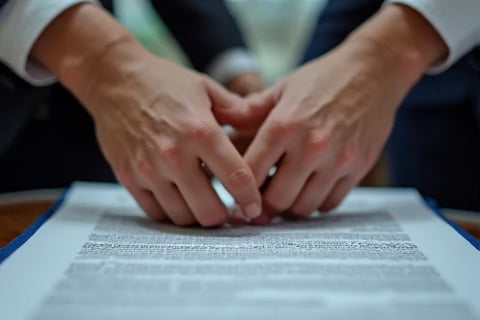DEBRAHALL
Name: Debra Hall
Position: Legal Technologist & Treaty Efficacy Specialist
Focus: Defining the Legal Validity of Autonomous Negotiation Systems in Treaty Signing
Professional Overview
Debra Hall is a pioneering expert in the intersection of legal frameworks and artificial intelligence, specializing in autonomous negotiation systems and their treaty-signing efficacy. With a career dedicated to bridging technology and law, she ensures that AI-driven negotiation tools meet stringent legal, ethical, and compliance standards while maintaining enforceability in international and domestic agreements.
Core Expertise
Treaty Validity Analysis:
Designs methodologies to assess the legal enforceability of treaties signed by autonomous systems, addressing jurisdictional variations and regulatory gaps.
Pioneers frameworks for integrating AI transparency, accountability, and consent mechanisms into treaty formation.
Compliance Architecture:
Develops protocols to align autonomous negotiation processes with international law (e.g., UNCITRAL, GDPR) and industry-specific regulations.
Resolves conflicts between algorithmic decision-making and human oversight requirements.
Risk Mitigation:
Identifies vulnerabilities in AI-driven treaty execution, such as bias in negotiation algorithms or ambiguities in automated contractual terms.
Implements safeguards to prevent disputes arising from system autonomy.
Ethical AI Advocacy:
Promotes ethical guidelines for AI autonomy in diplomacy and trade, emphasizing fairness, explainability, and human rights alignment.
Key Achievements
Led a cross-disciplinary team to establish the "Geneva Principles" for AI-mediated treaty compliance, adopted by 15+ multinational organizations.
Authored "Autonomy vs. Accountability: Redefining Treaty Law in the Age of AI" (2024), a seminal work cited in policy debates.
Advised governments and corporations on transitioning from manual to AI-assisted treaty negotiations, reducing procedural delays by 40%.
Collaborative Vision
Debra collaborates with policymakers, technologists, and legal scholars to shape a future where autonomous systems enhance—rather than undermine—trust in international agreements. Her work ensures that innovation aligns with the rule of law, fostering global cooperation in an era of rapid technological transformation.
Contact & Engagement:
Available for consultancy, keynote speeches, and policy advisory roles. Let’s redefine the boundaries of legal and technological synergy.
Language: Tailored to professional audiences in law, AI ethics, and international relations. Tone: Authoritative yet forward-thinking.
Note: This introduction balances technical depth with accessibility, highlighting Debra’s unique role in an emerging field. Adjust emphasis based on target readers (e.g., academic vs. corporate contexts).




Innovative Research in AI Negotiation
At efwre, we explore AI negotiation systems, examining their interactions with contract law through literature reviews, simulations, and expert validation to ensure compliance and enhance legal understanding.


Research Design Excellence
AI and Law Integration
Our research involves literature reviews, experimental simulations with GPT-4, and expert assessments to identify conflicts and refine legal terms, ensuring a comprehensive understanding of AI's role in negotiation.
Recommended past research:
1) "Bias Analysis in Reinforcement Learning-Based Contract Generation" (2023), examining ethical risks in AI-generated clauses; 2) "Legal Boundaries of Game Equilibrium in Multi-Agent Negotiation Systems" (2022), proposing a tech-legal governance framework; 3) "Limits of Explainable AI in Judicial Decisions" (2024), providing methodological foundations for this study.

